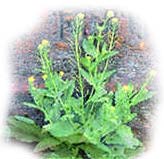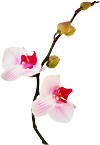Is the mustard seed the smallest of seeds?


Alleged Biblical problem
In Matthew 13:31-32, Jesus said that the mustard seed was “smaller than all other seeds,” but that when it was full grown, it would be large enough for birds to nest in its branches.
Today, we know that there are seeds even smaller than the mustard seed. For instance, the orchid seed is so small and fine that it’s almost dust-like. There are those who would also question whether a mustard seed could ever grow into a tree that is large enough to hold a bird nest.
Now, if Jesus (who claimed to be God) was wrong about the mustard seed, why should we trust anything else that He said? And on what basis can the Bible be considered reliable on any scientific or historical matter?
Sensible solution
Please note that Jesus was not comparing the mustard seed to all other seeds in the world, but to seeds that a local, Palestinian farmer might have “sowed in his field,” i.e., a key qualifying phrase in verse 31. And it’s absolutely true that the black mustard seed (Brassica nigra = Sinapis nigra) was the smallest seed ever sown by a first-century farmer in that part of the world.
It’s also true, as many modern-day encyclopedias will tell you, that the black mustard seed in Israel will typically grow to heights of 3.7 meters, or 12 (twelve) feet—plenty large enough to hold a bird nest.
It’s important to remember that the Bible often uses everyday terminology in order to communicate simple truth. Even today, we might refer to a “sunset” when, technically, scientifically, we know that the sun never actually “sets,” i.e., it’s the Earth that revolves.
When people come to visit us here in north central Maine, we might take them on a drive, passing a good number of lakes and ponds, to Moosehead Lake, which I will describe to them as being “the largest lake of all.” Of course, our guests will usually realize that I’m speaking locally, not globally. They don’t often question my credibility.

The context of Matthew 13 makes it quite clear that Jesus was addressing a local lay audience, not an international conference of botanists. It seems that no reasonable person would therefore insist for very long that this text provides a viable basis for questioning either Jesus or the Bible, when it comes to getting the facts straight—scientifically, historically, or technically.
Relevant principles for dealing with Bible difficulties
Keep the text in context. Failing to consider the historical and Biblical context of a particular verse or passage may be the most common mistake of all. But it’s crucial to an accurate understanding of the text. The Bible doesn’t approve of everyone whom it quotes or talks about.
Subject the obscure to the straightforward. The Bible is clear about many things, so always allow the which is clear to be a guide in unraveling that which is not clear. In other words, trust the perspicuity of Scripture. As the old adage goes, "Let the main things be the plain things, and the plain things be the main things."
Allow for partial accounts, quotes, and particular points of view. Don’t always assume that a report or quote is wrong just because it happens to be less than 100% complete.
Acknowledge the difference between citations and quotations. Many times a passage from the Old Testament may be referenced in the New Testament without necessarily being quoted. Why shouldn’t a writer be allowed to cite the essence of a text, just as we often do today, without offering an exact word-for-word quote?!
Remember that the Bible employs literary devices. Metaphors, analogies, types, allegories, hyperboles, and similes would all be examples of this.
Helpful resources
Bible “Contradictions” & Puzzles (ChristianAnswers.Net)
Hard Sayings of the Bible, edited by Kaiser, Davids, Bruce, and Branch (Intervarsity Press, 1996).
Bible Difficulties Solved, by Larry Richards (Revell, 1993).
More Information About the Bible
How do we know the Bible is true? Answer
INFALLIBILITY—How can the Bible be infallible if it is written by fallible humans? Answer
When we say that the Bible is the Word of God, does that imply that it is completely accurate, or does it contain insignificant inaccuracies in details of history and science? Answer
Visit AIIA Institute—AIIAInstitute.org
Author: Daryl E. Witmer of AIIA Institute.
Text Copyright © 2002, AIIA Institute, All Rights Reserved—except as noted on attached “Usage and Copyright” page that grants ChristianAnswers.Net users generous rights for putting this page to work in their homes, personal witnessing, churches and schools.



